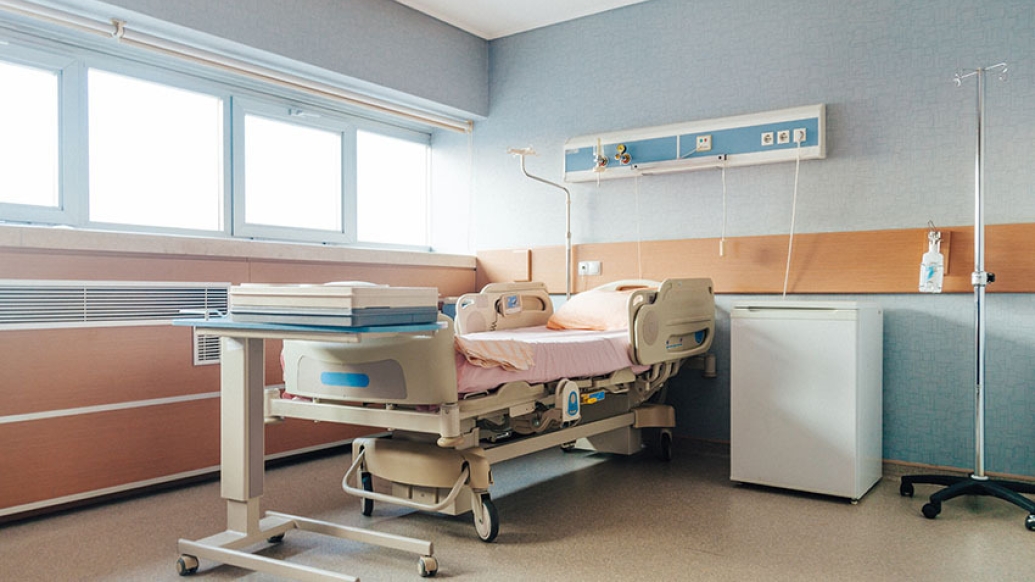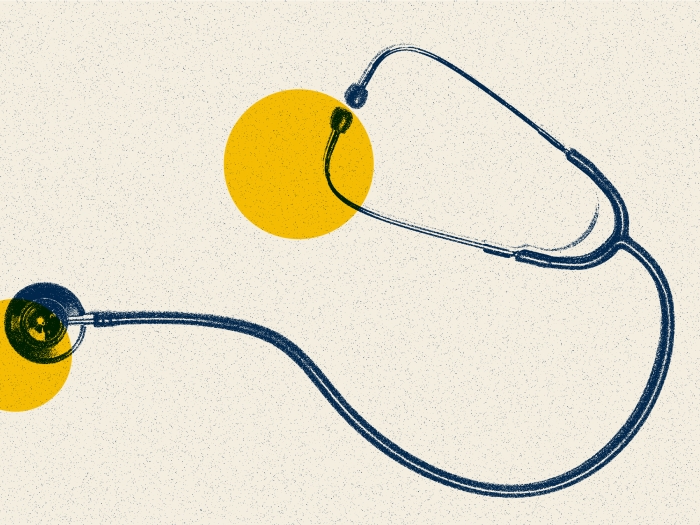Students adapt and reintroduce a bedside program amid COVID-19 crisis to better console patients.
11:19 AM
Author |

Interrupted by the coronavirus, a bedside program that brings comfort to patients who find themselves alone at the end of their lives has been adapted and reintroduced by U-M medical students.
COVID-19 forced the suspension of Michigan Medicine's No One Dies Alone (NODA) program, which relies on a network of trained volunteers whose access to the clinical wards has been restricted for safety reasons. While stories of coronavirus patients having to be alone during their last moments have garnered national attention, the problem extends to non-COVID patients, too, as the pandemic has made it much more challenging for family to visit the hospital, said Social Work Program Manager Amanda Schoettinger, who launched NODA at Michigan Medicine in 2017.
"It's not just the institutional limitations on visitors. The travel restrictions make it more difficult for those coming from far away," said Schoettinger, LMSW. "Some people aren't working and might not have the money to travel. Some are sick themselves. A lot of people are afraid to come to the hospital, which is understandable. This issue isn't limited to the COVID wards."
'An essential part of humanity'
Schoettinger worked with third-year UMMS student Steven Davidson, one of the lead NODA program coordinators, to train a small group of medical students to hold vigil with dying patients. Safety risks and PPE preservation policies mean the program isn't available in COVID treatment areas, but the program is up and running in other parts of the hospital. Davidson's idea to modify NODA using medical student volunteers followed a relative's lengthy — and lonely — stay in the hospital with suspected COVID-19.
"My uncle thankfully did not pass, but in his three weeks as an inpatient there was almost no connection to his family. He was able to see my aunt a few times on video calls, and those sessions relied on nurses who took time they didn't really have in order to make that happen," Davidson said. "That experience was a big motivator."
With clinical rotations canceled and classes moved online, medical students have been seeking ways to get involved in COVID-19 response, both in the community and in the clinical setting. Davidson's NODA-extension proposal is one of three in-person, patient-facing projects approved to-date that finds medical students helping in the clinical space. All student volunteer activities are being organized and approved by the M-Response Corps, which includes student, administrative and clinical leaders who vet each proposal.
MORE FROM THE LAB: Subscribe to our weekly newsletter
"We've gotten several clinical-based proposals and a few have been declined or asked to modify their plans. Not that they aren't good ideas, but we are balancing safety with necessity," said Nadine Ibrahim, an M-Response Corps co-director and a fourth-year UMMS student. "The unique thing about Steven's proposal is that the program, while not a part of clinical care or management, is essential for humanity. This project in particular stood out as something that we needed to do."
Preparing the volunteers
Davidson revamped the NODA program training, normally conducted in person, to be conducted online with a reflective writing component. More than a dozen student volunteers have been trained so far, and the first student-led vigils have already started. Volunteers sit in four-hour shifts with patients identified by health care staff, talking with patients whether or not they are responsive. Volunteers do web-based debriefing sessions with program leads after their first vigil and again in the event that a patient passes away in their presence. The NODA program also meets as a whole every other week for a group debriefing session to form a community of support, understanding and new ideas.
"Having conducted vigils myself, I know how emotional it can be," Davidson said. "Our top priority is to properly prepare our volunteers. We want to make sure they have a plan to cope and that we support them through their process."
A resource for COVID patients
Because of the dangers associated with potential exposure, student volunteers are not currently able to sit vigil with COVID-positive patients. However, Davidson was recently able to obtain tablets for NODA volunteers who plan to help coordinate webcast family visits for patients on the COVID wards.
"It is an inappropriate risk to have volunteers in COVID rooms, but with the video conference technology available we see an opportunity to facilitate some interaction," Davidson said. "The front-line staff would still need to be in the room to set it up, but we could take the initiative behind-the-scenes to handle the logistics of coordinating with the family, scheduling and determining which technology to use."
SEE ALSO: Seeking Medical Care During COVID-19
"It takes an emotional toll not just on the families, but also on the providers who care so much but don't necessarily have the bandwidth to take 15 minutes and make three phone calls to arrange a video chat, though many of them still do," he said.
Offering the assistance not only supports the family who can't be there in person and busy front-line care teams, but is also a good learning opportunity for the student volunteers, Schoettinger said.
"With the end-of-life care, they talk a little bit about it in medical school but it's not necessarily something all students experience as part of their rotations," she said. "This program gives them an opportunity to fully experience it — being connected to this patient at the end of their life as a person, not just a physician. That's a powerful learning experience."

Explore a variety of healthcare news & stories by visiting the Health Lab home page for more articles.

Department of Communication at Michigan Medicine
Want top health & research news weekly? Sign up for Health Lab’s newsletters today!





